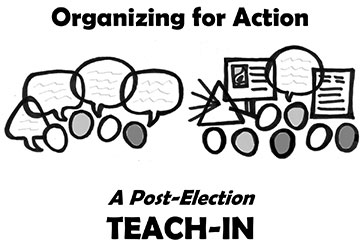
11/30/2016
In the wake of a tumultuous and divisive presidential election that left many people wondering how the campaign’s promises and rhetoric will affect their lives, members of the SUNY Cortland community are gathering for a “teach-in.”
SUNY Cortland students, faculty, staff and Cortland community members have organized a wide-ranging, post-election teach-in on Friday, Dec. 2, from 4 to 6 p.m. in Old Main, Room 209.
Titled “What Do We Do Now? Organizing for Action,” the event is free and open to the public. Teach-ins, created on college campuses in the 1960s around the Vietnam War protest movement, are aimed at sparking conversation about current events and issues that ultimately results in some sort of action.
Karla Alwes, a SUNY Cortland professor of English, said the event will be the third in a series organized for faculty, staff and students working toward an understanding of where they, their College and the nation stand following the Nov. 8 election of Donald Trump as president.
In addition, the Office of Multicultural Life and Diversity has held three public meetings with members of the campus community to share thoughts on diversity issues at SUNY Cortland as well as gatherings of underrepresented groups on campus to discuss the results and fall-out from the election. The student group Young Americans for Liberty has held a public forum to discuss how people from all political groups can move forward after the election.
“The teach-in is a way to build on critical arguments and observations that have come from the election, one that has left so many feeling alienated,” Alwes said.
On Friday, students, faculty, staff and representatives from New York Public Interest Research Group (NYPIRG), will share information on issues highlighted by the campaign, including environmental protection, race relations, immigration reform, reproductive rights, First Amendment protection, higher education affordability, social welfare programs and criminal justice reform.
Colleen Kattau, an associate professor of Spanish in the Modern Languages Department, will serve as faculty moderator, while Joseph Mogavero, a junior adolescence education: English major from Massapequa, N.Y., will be the student moderator. They will facilitate a discussion on post-election activism. NYPIRG coordinators Skylin Baestlein and Alexandra Cicero will help organize roundtable discussion.
“Policy-making is a dialectical process that requires informed arguments all across the political spectrum,” Mogavero said. “It is important that we discuss serious political issues as an entire college community, so that we can equip ourselves with the right tools to advocate for our interests as individuals and as a public institution of higher education.”
According to Seth Asumah, SUNY Distinguished Teaching Professor of political science and chair of the College’s Africana Studies Department, the teach-in will question the American national ethos as it relates to race, gender, immigration and the politics of difference.
“We are in a unique position as social justice advocates to deal with difficult dialogues,” Asumah said. “We must work with our students and each other to develop skills for handling controversies with civility as civic actors, mindful listeners and critical thinkers.”
Caroline Kaltefleiter, a SUNY Cortland professor of communication studies, will share strategies for detecting and reporting fake (or faux) news, which is playing an increasing role in the national debate.
“Overwhelmingly, what we’re finding is a void in understanding differences among sponsored content, native advertising and authentic news reports,” Kaltefleiter said. “In this election, people shared stories from various social media platforms without checking sources.”
Kaltefleiter advocates organizing media literacy programs in public schools.
Mecke Nagel, a professor of philosophy at Cortland, said her concern lies with undocumented students and their family members and the psychological toll the current atmosphere takes.
Henry Steck, SUNY Distinguished Service Professor and a professor emeritus of political science at the College, will provide a list of strategies focusing on distinct policy issues and will address the persistent lobbying of elected officials.
“As members of a democratic society, members of the College community need to develop skills in both traditional and non-traditional ways of communicating with elected officials,” said Mary McGuire, a professor in SUNY Cortland’s Political Science Department. “They should leave college knowing everything from when and how to write effective letters to members of Congress to when and how to organize a protest.”
The teach-in will help participants find ways to connect with other concerned individuals.
“We have much to teach each other and plenty to learn in our efforts to organize for principled action,” said Victoria Boynton, professor of English. “All are invited to participate.”
For more information, contact Alwes, Boynton, or NYPIRG representative Skylin Baestlein.